How Do I Get a Job in Pharma With No Industry Experience?
Contents
- You need to aim for the right jobs
- Know what the job advert is REALLY telling you
- When to pick up the phone
- Tips for a “no experience” application
- When you’re missing an “essential” criteria
- How to get started
Click on a link above to jump straight to that section, or scroll down to read them all!
It’s one of the first questions that many prospective students ask us. And it’s one we’re happy to answer.
We can be this confident in our response because we’ve seen so many former students go on to start careers in the pharma industry. Many of them do this before they even finish their course.
So we’re SURE (especially in places like Ireland where the pharma industry is particularly strong right now) that it’s possible for someone to land a job in pharma without any previous pharma manufacturing experience.
BTW, if you are interested in a new career in pharma or want to upskill for a promotion, check out our pharmaceutical courses.
Aiming for the right jobs
Let’s get this out of the way first of all… you need to aim for the right jobs.
If you aim too high, then you’re likely to see adverts with a strong experience requirement.
Our students with no previous pharma industry experience typically fall into one of two camps:
- Bringing a specific and relevant skill set (such as quality or engineering experience), and taking a course to get to grips with the specific rules and regulations of the industry.
- Bringing a more general skill set from an unrelated industry (such as retail or hospitality), and taking a course to start a brand new career.
If you’re in the first group you probably have a clear idea about the types of roles you can apply for – since they’re very similar to the roles you’ve done in another industry.
If you’re in the second group, you might find it a little more difficult to find the right roles for you. You run the risk of aiming a little high and losing motivation when all you see are jobs that require significant experience.
The second group should generally be aiming at entry level manufacturing jobs.
Even if you know that in the long run you want to move into quality, validation, or more advanced manufacturing/production roles – entry level manufacturing is where you should aim for as a first step.
You should see these roles as the easiest door to open into the industry. These roles are an great way to get experience working directly with the rules and regulations of pharma. This makes them an ideal stepping stone to move on to advanced roles later.
So what exactly are these “entry level manufacturing roles”?
Well, the issue is that different companies call these roles different things.
There’s no standard job title – especially if you’re willing to consider pharma, biopharma, and medical device companies (see our Ultimate guide to pharmaceutical careers page for a breakdown of the differences).
Examples of suitable job titles include:
- Production Team Member / Packaging Team Member / Manufacturing Team Member
- Bioprocess Associate
- Biotechnician, Manufacturing
- Cleanroom Operative / Production Operative
- Assembler
- Product Builder
- Manufacturing Technician / Process Technician (BUT be aware that technician roles can be a more advanced role in some companies.)
What the job advert is REALLY telling you
“Every job advert I see needs experience”. We hear this said a lot and it’s simply not true. But it’s an easy mistake to make.
So let’s take a look at a few examples of job adverts that might look like they’re asking for industry experience at first glance…
Recognising GMP experience
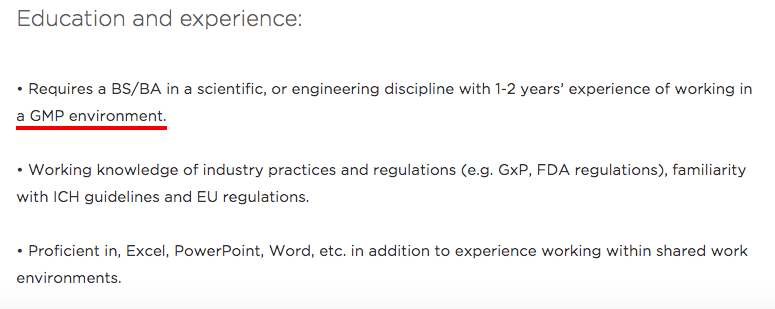
This first example is actually one of the most restrictive we’ll show.
Although they’re asking for some experience, it’s in a GMP environment (and not specifically pharma). Which means that if you’ve worked in food manufacturing, for example, there’s absolutely no reason not to apply.
Recognising experience from other industries
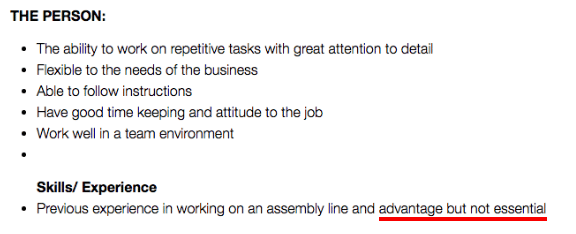
In this example we see that assembly line experience from any industry would be an advantage, but not essential.
So if you have any assembly line experience, you’d make sure that was surfaced clearly on your CV (and probably also mentioned within the personal profile section, to catch their attention).
But if you don’t… you could definitely still apply! You’d just have to make sure you carefully tailor your CV to show the transferable skills they’re asking for:
- Ability to work on repetitive tasks
- Great attention to detail
- Flexibility
- Ability to follow instructions
- Good time keeping and attitude
- Team working
Essential vs desirable / advantageous / preferable criteria
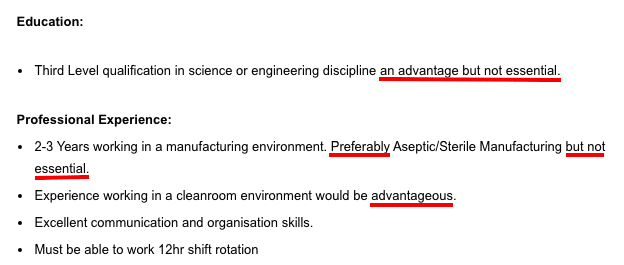
This is a similar case.
Here we see that the essential requirements are:
- 2-3 years working in a manufacturing environment
- Excellent communication and organisation skills
- Able to work 12hr shift rotation
Everything else is marked “an advantage”, “preferable”, or “not essential”.
If you can make a case for meeting the “essential” criteria, don’t worry too much about missing a “desired”, “advantageous” or “preferred” criteria.
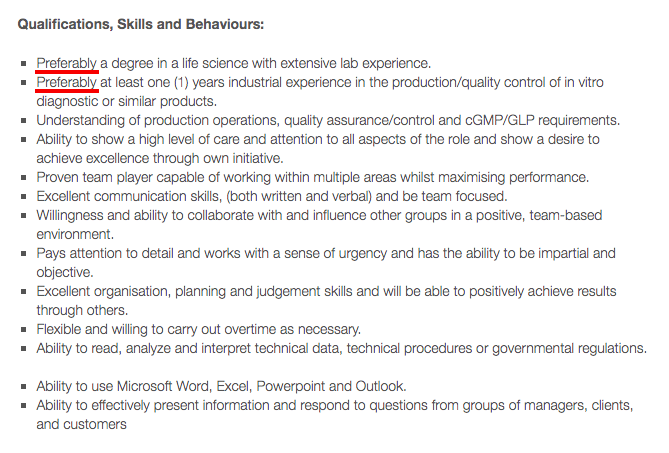
In this example we see that both the education and work experience criteria are “preferred” – not “essential”.
You’ll sometimes see a note that preference will be given to candidates with that “non-essential” experience, or that it’ll be used to filter applications if there are a lot of applicants.
But you can definitely still apply without it.
You have no idea how many other applications they’re getting or how appealing they might find some of the other skills or experience on your CV.
Different criteria for different applicants

In this example we see that GMP manufacturing experience is required for a candidate with a Level 6 qualification. But a candidate with Level 7 qualification, doesn’t have that requirement.
Always make sure you’re reading the criteria that’s applicable to you.
If you happened to have a Level 7 qualification and GMP manufacturing experience, you’d still be sure to highlight that prominently on your CV and cover letter. It might not be an essential criteria for you, but you’ve got a good clue about something they think is important, you wouldn’t ignore that.
The “ideal candidate”

Don’t be put off if you’re not the “ideal” candidate. An advert like this has chosen not to make these points essential so it’s definitely still worth applying.
Think of it like this… the employer thinks they know exactly what they want BUT they’re indicating that they could be persuaded by a strong case being made by a “non-ideal” candidate. Take your chance to make that case!
Some just say nothing
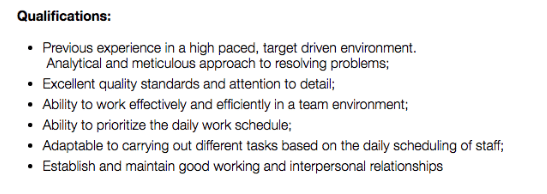
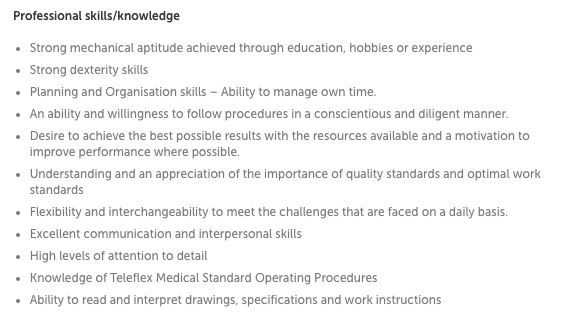
Don’t just assume that a long or detailed job advert has an essential experience requirement. Always take your time to read through every advert that might suit.
If you’re reading appropriate level job adverts, you should definitely be seeing some that just don’t mention a need for previous experience.
It’s still vital that you tailor your application to meet the specific requirements of the advert though – highlight/demonstrate your experience with as many of the transferable skills as possible.
When to pick up the phone
If you’re not sure and there are contact details listed, then call and talk to someone.
This is particularly true if it’s a recruitment company listing the advert.
If a recruitment company is involved, they’ll review CVs first and talk to applicants before sending some on for the employer to review. They’ll know if you’re likely to be the type of candidate they’re looking to put forward for this role.
If it’s not via a recruiter, remember that every point of contact you have with the company should be considered part of the application process. Make sure you’ve thought through your strengths and are clear about what you’re asking.
Advert are generally clear, and people are busy, so don’t make a call every time “just in case”.
Keep in mind that attention to detail and ability to follow written instructions are typically highly sought after skills in this industry. If an advert makes a point clearly, don’t phone to ask about it.
5 tips for a “no experience” application
Hopefully you can see that there are LOTS of times when it’s entirely appropriate to be applying for entry level pharma manufacturing jobs, even if you don’t have previous industry experience.
If you’re in that position, here are 5 tips for your CV and application:
1. Don’t be apologetic – if you’re applying for an appropriate job then you deserve to be considered, don’t feel the need to draw attention to a lack of any specific experience.
2. Prioritise relevant items – make sure things that are most relevant to your application are prominent within it. Write a compelling cover letter and personal profile section for your CV that really speaks to that specific advert’s requirements. (This is one of the key things we cover in our Advanced Career Coaching course).
3. Highlight steps you’re taking to make this career change – if you’re taking one of our courses, make sure you list it in the education section of your CV. At a recent careers fair several employers told us that a candidate just being enrolled in a programme is seen as a positive on their application. You might find it useful to give a brief description of the course or list out the modules so an employer can see the types of things you’re learning.
4. Focus on transferable skills – when discussing your previous employment, keep the focus on transferable skills (e.g. communication, team work, attention to detail, etc). The duties of your previous jobs might not be especially relevant but there will always be transferable skills that are.
5. Tailor your CV for every application – ALWAYS tailor your CV to talk to the specific requirements of each job. A significant proportion of your CV should change for every application as you reframe your experience to draw on the parts most relevant to that employer.
When you’re missing an “essential” criteria
Don’t annoy employers by sending an application to a job you’re definitely not suitable for.
If there’s an essential criteria you’re missing, there are 2 things to do:
1. Move on to the next advert – don’t dwell on the ones that aren’t suitable when there are so many that are.
2. Send that company a speculative application – if you’ve found a company you’re interested in working for but the specific job advertised wasn’t a good fit for you, check out how they accept speculative applications and submit there. Perhaps there are relevant jobs coming up, or perhaps there will be a vacancy in the future – many companies will keep your application on file and let you know if something suitable comes up.
When you’re missing an “essential” criteria
How to get started
If you’re definitely looking at the right level of roles (as outlined above), and you’re still finding yourself put off from applying, take a step back to try to see if there’s a chance you’re looking for reasons not to apply.
Unsurprisingly, our students who have success the quickest are the ones who are willing to put themselves out there, make lots of applications, and take a few chances.
It can be scary to actually start applying for jobs in a new industry. But if you don’t apply, you’re never going to get that first job.
Realistically, it’s going to take a lot of applications before you get your first pharma job so the quicker you get started, the quicker you’ll have a job.
Follow the process – if you’re unsure, you can check out over 40 online job hunting resources or you can sign up for our Pharma Career Coaching course where we walk you through the job-hunting process step by step.
About the Author
Claire Wilson
Content Marketing and Career Coaching
Claire runs GetReskilled’s Advanced Career Coaching Programme – our specially devised job hunting course that helps our trainees take that final step into employment by leading them through the job hunting process. She is extremely enthusiastic about helping people reach their final goal of employment in their new career path.
Claire has a BSc (Hons) in Medical Biology from Edinburgh University and spent 7 years working in the pharmaceutical and medical device industries.


I’d love to work with/and for your company.